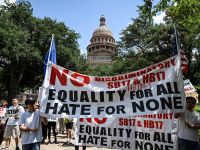Chinese authorities were trying Monday to contain religious violence which has rocked a corner of northern China, but resentment was still simmering among the Muslim Hui community, witnesses said.
Officials at mosques in the region said Monday there was deep unhappiness among the Muslim community over the way the authorities had handled last week's unrest, which left at least six Muslims dead and scores injured.
Some 2,000 demonstrators marched through Mengcun county in Hebei province Sunday before the funeral of one of the victims, to that their anger be addressed, said an official at Mengcun mosque.
The families of each of the six victims had been offered 200,000 yuan (24,000 dollars) each, and local officials had appealed to the demonstrators not to blow the incident out of proportion, the same source said.
He said the Muslim community was drawing up a petition to the government to demand justice.
"It's a most reasonable request. Money is not the most important thing. We want dignity for Muslims," said the mosque official.
Armed police opened fire on a crowd of up to 2,000 Muslims from Mengcun on December 12 as they made their way towards Yangxin county in neighboring Shandong province to support fellow Muslims in a three-month feud with the Han Chinese community.
Witnesses told AFP that some of those who died were savagely beaten by police with metal bars or dragged by the neck along the road.
The Muslim community has accused the police of siding with the Han Chinese community.
The violence first erupted in September after a Han Chinese vendor infuriated Muslims in Yangxing by putting up a sign offering "Islamic pork".
The vendor and another Han were killed in violence triggered when Muslims removed the sign, and scores of other people have been injured in clashes over the past two months.
The latest flare-up was caused by Han Chinese hanging a pig's head outside the mosque in Yangxin on December 8. The provocation, in the middle of the Islamic holy month of Ramadan, enraged Muslims throughout the region.
Before the eruption of violence in September, Han Chinese and members of the Muslim Hui community had lived in harmony for decades in the region, just three hours train ride from Beijing, and inter-marriage has been common.
Frank Lu, spokesman for the Hong Kong-based Information Center for Human Rights and Democracy, said the central government in Beijing had viewed the violence with alarm.
He said 2,000 Communist Party cadres, as well as the Shandong province governor, had been sent to Hui villages to calm the situation.
Lu added that news of the shooting and the way the authorities had treated the Muslim community had stirred up the Hui community across the country.
"This thing is heating up all over the country. Hui people are very upset about this," he said.
The violence has yet to be reported in China's official media, although a government official confirmed to AFP on Monday for the first time that the incident took place after days of denials.
The official in Mengcun said five people died. "It's still rather chaotic. We don't want anything to happen so we're on 24 hour duty," he said.
The Huis, descendants of Arab and Persian traders who settled from the 7th century onwards, are represented in most parts of China.
For the most part, they are assimilated and virtually indistinguishable from the Hans -- BEIJING (AFP)
© 2000 Al Bawaba (www.albawaba.com)







